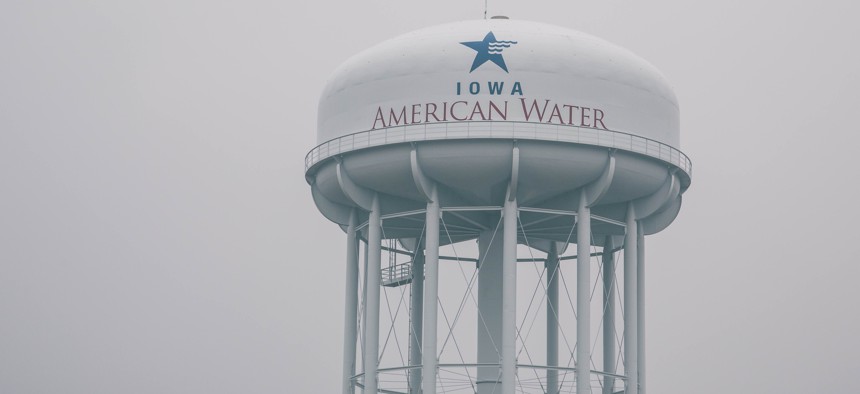Private Water Utility Shareholders Reject Transparency Proposals

An Iowa American Water Company water tower. Wikipedia Commons/Tony Webster

Connecting state and local government leaders
The proposals would have required American Water to make new disclosures on political contributions and lobbying.
Investors in the nation's largest publicly-traded water and wastewater utility rejected proposals last week that called for the company to issue reports about political contributions and lobbying activities.
American Water runs utilities in about 1,600 communities, in 16 states, with about 3.4 million customers. The company's "regulated businesses," which include its utilities, recorded about $2.9 billion in operating revenues in 2017, according to an annual report.
Two asset management firms offered the disclosure proposals during a stockholder meeting in Camden, New Jersey on Friday.
Boston Common Asset Management, LLC, a firm that describes itself as pursuing both financial returns and "social change," requested an annual report from American Water showing policies and payments for lobbying activities, along with other related information.
A description of the proposal says the company has spent over $1.1 million on federal lobbying since 2010, and that it engages in extensive lobbying at the state level, where disclosure is "uneven or absent."
"Lobbying transparency is in the best interest of American Water and its shareholders," said Kate Monahan, a shareholder engagement associate with Friends Fiduciary Corp., who Boston Common Asset Management authorized to present the proposal during the meeting.
In an opposing statement to the proposal, American Water said it fully complies with federal, state and local lobbying disclosure laws, and that the requirements in the proposal are vague, would be cumbersome to carry out and are not standard among competitors.
The political contribution disclosure proposal was offered by Trillium Asset Management, LLC, which says its investment strategy incorporates environmental, social and governance factors.
The proposal called for American Water to produce reports describing policies and procedures for making contributions to political campaigns or to influence ballot initiatives, as well the amounts, recipients and other details for the contributions.
American Water's opposing statement says its political contributions are subject to federal and state public disclosure rules and that much of the information that would appear in the requested reports is already publicly available.
The company also says it is committed to adopting a policy this year to guide direct political contributions and that it would publish this online. And that, beginning with 2018, it aims to provide information on its website about political contributions, after each fiscal year.
Shareholders shot down both proposals, according to preliminary voting results announced at Friday's meeting.
They also rejected a third proposal, which asked for a report to shareholders tracking American Water's "impacts and responses on the human right to water and sanitation."
The proposal, from NorthStar Asset Management, Inc., suggested the report include information like: whether and how the company identifies business partners with poor track records on human rights and the environment; and the percentage of customers paying water rates exceeding 2.5 to 3 percent of monthly household income.
American Water's board opposed this report, too. The company said it would be duplicative with publications it currently issues (such as its Corporate Responsibility Report), and it said its business is already extensively regulated when it comes to issues like setting rates.
New Jersey, Pennsylvania, Illinois, Missouri, Indiana, California and West Virginia have the bulk of American Water's customers.
The company said in its 2017 annual report that it had plans for $7.2 billion in capital investment over five years, mainly for upgrading pipes and water and wastewater treatment facilities.
It also said a core part of its growth strategy is to pursue acquisitions of small and medium water and wastewater systems, with between 1,000 and 30,000 customers, that are near where the company now operates.
Bill Lucia is a Senior Reporter for Government Executive's Route Fifty and is based in Washington, D.C.

NEXT STORY: If IGs are going to work together, they need better collaboration tools





